- Home
- Peter Straub
Mystery Page 9
Mystery Read online
Page 9
Mr. von Heilitz turned to Tom with an expression the boy could not read at all. “It should have been a moment of triumph for me. I had found out who I was. I had discovered my life’s work. I was an amateur detective—an amateur of crime. But my triumph almost immediately did worse than go sour. It turned into disgrace. During the months between his arrest and execution, the man I had found never stopped talking. He implicated my father in his own murder.”
“How could he do that?” Tom asked.
“I don’t mean he said that my father wanted to be killed, but that he was executed. According to this man, my father had participated in certain arrangements that were set up just around the time of Mill Walk’s independence. He was an active partner in these arrangements. The arrangements had to do with the sugar revenues, with the way tax revenues were handled, with the bidding on road construction and garbage disposal, with water allocations, the banks, with certain fundamental structures that were set up at that time. There were irregularities, and my father was deeply involved in them. According to the murderer, my father had ceased to be cooperative. He wanted a disproportionate share of all these fundamental arrangements. And so this man had been hired to kill him. It was supposed to look like a robbery.”
“But who was supposed to have hired him?”
“He never knew. He was given instructions through a Personals ad in the Eyewitness, and money was paid into his Swiss bank account. Of course the implication was that the highest officials in Mill Walk were involved, and the more he said, the more the public was outraged—he was obviously clouding the issue, trying to take the spotlight off himself and blame everybody else. The secret police were suspect anyhow, and had been disbanded shortly after independence. When this man’s record was made public, even those who had thought there might be something to his charges turned against him. His own stories counted against him, in the end. I myself had a certain amount of fame, as the one who had led to his arrest.”
“Then why …?”
“Why did I end up living like this? Why do I object to your writing to Captain Bishop?”
“Yes,” Tom said.
“First of all, I’d like to know if you signed the letter.”
Tom shook his head.
“It was an anonymous letter? Good boy. Don’t be surprised if nothing is done. You know what you know, and that is enough.”
“But after the police read the letter, they at least have to look at the car more carefully, instead of just taking Hasselgard’s story as fact. And when they find the bullet, they’ll know that Hasselgard’s story wasn’t the truth.”
“Captain Bishop already knows it wasn’t,” said the old man.
“I don’t believe that.”
“I discovered, soon after the execution of my father’s murderer, that except for one detail the man had been telling the truth all along. My father’s death had been ordered by the highest levels of our government. Corruption was a fact of life on Mill Walk.”
“Well, that was a long time ago,” Tom said.
“Nearly fifty years ago. There have been many, many changes on Mill Walk since then. But the Redwings still exert a large influence.”
“They’re not even in government anymore,” Tom protested. “They just do business. They’re social. Half of them are too wild to do anything but race cars and throw parties, and the other half is so respectable they don’t do anything but go to church and clip coupons.”
“Such are our leaders,” the old man said, smiling. “We will see what happens.”
A few minutes later Lamont von Heilitz stood up from the table, and walked into the maze of files. Tom heard the opening of a metal drawer. “Have you ever been to Eagle Lake, in Wisconsin?” he called to Tom, who could just see the top of his silvery head over a stack of papers atop an iron-grey cabinet.
“No, I haven’t,” Tom called back.
“You may be interested in this.” He reappeared with a large leather-bound book under his arm. “I own a lodge in Eagle Lake—it was my parents’, of course. We spent our summers ‘up north,’ as Mill Walk says, all during my boyhood, and after I had returned from Harvard I used the lodge for a number of years.” He put the thick book down on the table before Tom and leaned over his shoulder. His index finger rested on the book’s wide brown cover, and when Tom looked he saw that the old man was smiling. “The way you’ve been talking—the way I can see that you feel—all of that, even though you haven’t said half of what’s been going through your head—reminded me of this case. It must have been the third or fourth time I used my methods to discover the identity of a murderer, and it was one of the first times I made the results of my investigations public. As you will see.”
“How many cases have you investigated?” Tom suddenly wanted to know.
Von Heilitz lifted his hand from the book and put it on Tom’s shoulder. “I’ve lost count now. Something over two hundred, I think.”
“Two hundred! How many of those did you solve?”
The old detective did not answer the question directly. “I once spent a very interesting year in New Orleans, looking into the poisoning deaths of a series of prominent businessmen. I was poisoned myself, in fact, but had taken the precaution of supplying myself with a good supply of the antidote.” He nearly laughed out loud at the expression on Tom’s face. “I regret to say that the antidote did not save me from an extremely uncomfortable week in the hospital.”
“Was that the only time you were injured?”
“I was shot once—in the shoulder—and shot at four times. A bear of a man in Norway, Maine, broke my right arm when he found me photographing a Mercedes-Benz that was up on blocks in a shed out behind his house. Two men have cut or stabbed me with knives, one in a native house a block from where we saw each other in Weasel Hollow and the other in a motel called The Crossed Keys in Bakersfield, California. I was beaten up seriously only once, by a man who jumped me from behind in an alley off Armory Place, near police headquarters. But in Fort Worth, Texas, a state senator who had killed nearly a dozen prostitutes nearly killed me too, by hitting me in the back of my head with a hammer. He fractured my skull, but I was out of the hospital in time to see him hanged.”
He patted Tom’s shoulder. “It’s a sorry calling at times, I fear.”
“Have you ever killed anyone?”
“The only man I ever had to kill was the one who broke my arm. That was in 1941. The end of every investigation brings a depression, but that one was my worst. I came back to Mill Walk with my arm in a cast, and I refused to answer my phone or go out of this house for two months. I scarcely ate. I suppose it was a kind of breakdown. In the end I checked myself into a clinic, and stayed there another two months. ‘Why do you always wear gloves?’ the doctors asked me. ‘Is the world so dirty?’ ‘I’m at least as dirty as the world,’ I remember saying; ‘maybe I want to keep from contaminating it, instead of the other way around.’ I can remember catching sight of my face in the mirror one day and being shocked by what I saw—I saw an adult, the person I had become. Soon my depression began to lift. I came back here. I found that I was refusing many more cases on the mainland than I accepted. After a while, my reputation wasn’t even a dim memory, and I was free to live as I wished.” He took his hand from Tom’s shoulder and pulled back his chair. “And some years ago, I saw you in an unexpected place. And I knew that we would meet some day and have this conversation.”
He sat down, with an old man’s briskness, on his chair. “I wanted to show you the first pages in this book, and instead I talked your ear off. Let’s take a look at this before you fall asleep.”
Tom had never felt less sleepy. He looked at Lamont von Heilitz sitting a yard away from him with his eyebrows raised and his gloved fingers just opening the big leather journal. The old man looked drawn and noble, the refinement of his face starker than ever in the soft light, the grey wing of hair on the side of his head glowing silver. Tom realized that he was looking at the real thing. Seated a yar
d away from him, slightly imperious and slightly ravaged, more than slightly diminished by age, was a great detective, the actuality behind literally thousands of novels, movies, and stage plays. He did not raise orchids, inject a seven percent solution of cocaine, or say things like “Archons of Athens!” He was an old man who seldom left his father’s house. All Tom’s life, he had lived across the street.
The book, a more elegant version of his scrapbook, lay open on the table. Tom read the huge headline on the left-hand page. MILLIONAIRE SUMMER RESIDENT DISAPPEARS FROM HOME. Beneath the headline ran the subhead: Jeanine Thielman, Mill Walk Figure, Last Seen Friday. Beneath this was a grainy picture of a blond woman in a fur coat stepping down from a coach-and-four. A diamond necklace glittered at her throat, and her hair was swept back from her forehead. She looked sleek, rich, and powerful, stepping down from the platform with a long, outstretched leg. Her smile for the camera was a grimace of willed artifice. Tom understood immediately that the woman had been photographed arriving at a charity ball. She reminded him of his mother, in old photographs taken when she had been Gloria Upshaw, a member of Mill Walk’s Junior League.
Tom looked at the name and date of the newspaper—the Eagle Lake Gazette of June 17, 1925.
“The seventeenth of June was the day after I arrived in Eagle Lake that year. Jeanine Thielman, who was the first wife of our neighbor’s father, Arthur Thielman, had disappeared during the night of the fifteenth. Arthur found her missing when he looked into her bedroom in the morning, sent a messenger around to the other lodges, including the Redwing compound, to see if she had been visiting one of her friends, found that no one had seen her since a dinner party at the senior Langenheims’ the night before, and waited through all of the sixteenth before riding over to the police station in the town of Eagle Lake. See? It looks like nothing more than newspaper hysteria over a rich woman. People gossiped about this young couple sleeping in separate bedrooms.”
Mr. von Heilitz pointed to the page on the left-hand side of the big journal. “This is the day I arrived. I found Arthur Thielman sitting on my porch furniture with a big setter bitch lying beside him. He’d heard I was due, and told his servants he was going to take his dog out for a walk. Arthur was a rude man, and he started telling me I had to help find his wife even before I got out of my carriage.” MYSTERY DEEPENS, the big headline read. “Told me I had to stop off in Miami, where they had an apartment, before going back to Mill Walk. I was not to tell anyone what I was doing. He thought the Eagle Lake police were incompetent, but he didn’t want anyone to know he’d hired me. ‘You’re the Shadow, aren’t you?’ Arthur said—he was trying not to yell. ‘I want you to behave like a goddamned shadow. Just find her and report back to me. I want this thing to die down quickly.’ He’d pay me anything I wanted. Then he astonished me—he apologized for ruining my vacation. I told him I wasn’t interested in his money, but that I would see what I could do from Eagle Lake. He wasn’t very satisfied with that, but in the end he was grateful—so I got the feeling that he thought that she might be somewhere in the area, after all. At any rate, by that point he regretted having panicked and gone to the police. Because of these headlines, he was a prisoner in his lodge—he couldn’t show his face at the club, and he was sick of talking only to his servants and the local constable.”
Tom looked at a photograph of Arthur Thielman standing beside his lodge, a rustic building with porches on two levels. Arthur Thielman was a corpulent, aggressive-looking man in a tweed jacket and high muddy boots. His rigid, Victorian face bore only the smallest resemblance to that of his son, now the Pasmores’ middle-aged neighbor.
“Two days later, Kathleen Duffield, a girl from Atlanta who was being groomed to marry Ralph Redwing’s cousin Jonathan, caught her hook on something in the marshy, north end of the lake. Jonathan wanted to cut the line and move to more promising territory—nobody ever fished the north end. Kate just thought it looked pretty up there, I gather. Anyhow, the girl kept on pulling, and eventually Jonathan jumped over the side to prove to his fiancée that all she’d hooked was a sunken row-boat. He followed the line underwater and found that she had snagged her hook on a clump of weeds. Not far away, halfway down a drop-off, he saw a rolled up length of old curtain fabric. He swam over to look at it. When he lifted the fabric, Jeanine Thielman’s body rolled out of it. She had been shot in the back of the head.”
Von Heilitz flipped over the page, and two new headlines blared out at Tom: JEANINE THIELMAN FOUND IN LAKE and LOCAL MAN CHARGED WITH THIELMAN MURDER. Pictures showed three policemen in lace-up boots and Sam Browne belts standing on a pier beneath a rear view of the Thielman lodge; a long slack thing beneath a sheet; an owl-eyed man moving down a corridor surrounded by policemen.
Tom thought: That’s what Eagle Lake looks like. He had a flash of Sarah Spence breaking the surface of the grey water, her hair streaming down her shoulders and her eyes gleeful. Then he felt that he had seen all of this before, in some dream-time before his accident: the very shape of the letters was familiar to him.
“The man they arrested, Minor Truehart, was a half-Winnebago guide who baited hooks and found bass for half a dozen families on the lake, including the Thielmans. He lived in a cabin near the lake with his wife and kids. He stayed sober until about noon, and after that the summer residents found him either annoying or amusing, but hiring him was a kind of tradition. Apparently he had some kind of disagreement with Jeanine Thielman the day before she disappeared—he turned up smelling of whiskey, she ordered him off, he claimed to be able to work just fine, and she blew her top. They were on the Thielman pier, and lots of people heard her screaming at him. Truehart eventually gave up and loped off. He claimed that he couldn’t remember what happened during the rest of the day, and that he woke up in the woods about five o’clock the next morning, with a godalmighty hangover. The police searched his cabin and found a long-barreled Colt revolver under the bed, which they sent off to the state lab for examination.”
“Was it his gun?” Tom asked.
“He said he had a gun, but that wasn’t it. He recognized it, though—he had sold it, he said, to old Judge Backer, a widower who came up to Eagle Lake for two weeks every summer and enjoyed target shooting. His wife said that a lot of guns came in and out of the house. Her husband made a little money dealing in them, looking out for special items for the gun collectors among the summer people. She didn’t recognize that one.”
Tom considered for a moment. “Did she remember the names of any of his gun customers?”
Lamont von Heilitz leaned back in his chair and gave Tom an almost paternal smile. “I’m afraid that Minor Truehart was the sort of husband who never tells his wife anything. But of course I thought about what might have happened to Judge Backer’s gun, all the more so when the Judge denied the entire story. He had never illegally purchased a weapon from anyone, of course. If it could be proved that he had, he could have lost his seat on the bench. I found myself wondering how likely it was that a drunken guide, enraged by the behavior of a customer’s wife, would shoot her in the back of the head.”
“What did you do?” Tom asked.
“I spoke to Judge Backer and his valet, Wendell Hasek, a boy from the west side of the island. I talked to people at the club. I went to the offices of the Eagle River Gazette and looked very closely at issues from earlier in the summer. I spoke to the local sheriff, who knew my name from the publicity about the few cases I had worked on. I had a long talk with Arthur Thielman.”
“He did it,” Tom said. “He stole the gun from the Judge’s lodge, shot his wife, rowed her body out to the end of the lake nobody ever used, and dropped her in. Then he framed the guide by sneaking into his cabin and hiding the gun. He probably tore down one of his own curtains and used it to wrap up the body.”
“Think about my situation,” the old man said, ignoring this. “It was a year after I had seen my parents’ murderer executed. I had almost inadvertently solved a very minor case several months befor
e—I had noticed a detail, nothing more, a question of the shoes a certain man had worn on the day of the murder—which added to my reputation, but left me feeling flat and dull. I had gone to Eagle Lake to forget the world, and to try to plan what I might do for the rest of my life. And here this murder is thrust in my face from the moment I reached my lodge, in the person of the unpleasant Arthur Thielman, sitting on my porch with his huge dog, seething with impatience, all willing to buy my time and attention, to buy me, in fact.…” ‘You’re the Shadow, aren’t you?’ I wished I were a shadow, so I could slip by him and lock him out of my house! I was so exhausted I said I’d help him just so he’d leave me alone. I thought it was very likely that she had simply run away from him. As soon as I had had a good night’s rest, I determined to have nothing to do with either of the Thielmans. I would ignore the entire matter.”
“But then the body was discovered,” Tom said.
“And the guide was arrested. And Arthur Thielman told me that he did not want my services anymore. I was to stop going around talking to all these people. He seemed particularly distressed that I’d spoken to Wendell Hasek, the Judge’s valet.”
“I told you,” Tom said. “He wanted to get rid of you. He was afraid of what you’d discover.”
“In a way. Remember my saying that I had a feeling he thought she might be somewhere in the Eagle Lake area, after all?”
“Of course. He knew she was deep in the lake, rolled up in an old curtain.”
The old man smiled and coughed into his fist. “Perhaps. It’s an intelligent supposition, in any case.”

 Poe's Children: The New Horror: An Anthology
Poe's Children: The New Horror: An Anthology Koko
Koko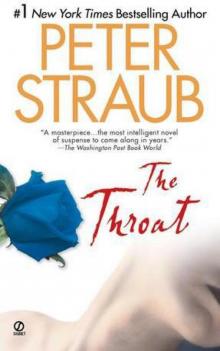 The Throat
The Throat Julia
Julia Interior Darkness: Selected Stories
Interior Darkness: Selected Stories A Dark Matter
A Dark Matter Floating Dragon
Floating Dragon Houses Without Doors
Houses Without Doors Mr. X
Mr. X Ghost Story
Ghost Story Mystery
Mystery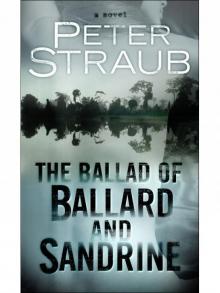 The Ballad of Ballard and Sandrine
The Ballad of Ballard and Sandrine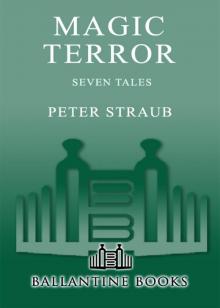 Magic Terror
Magic Terror In the Night Room
In the Night Room Lost Boy Lost Girl
Lost Boy Lost Girl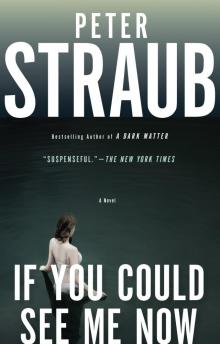 If You Could See Me Now
If You Could See Me Now The Hellfire Club
The Hellfire Club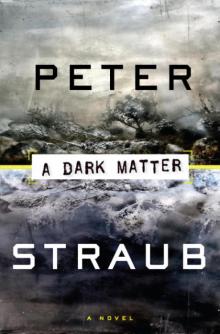 A Dark Matter: A Novel
A Dark Matter: A Novel Koko brt-1
Koko brt-1 Shadowland
Shadowland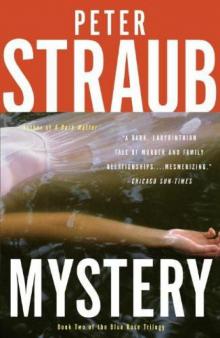 Mystery brt-2
Mystery brt-2 Interior Darkness
Interior Darkness Poe's Children
Poe's Children